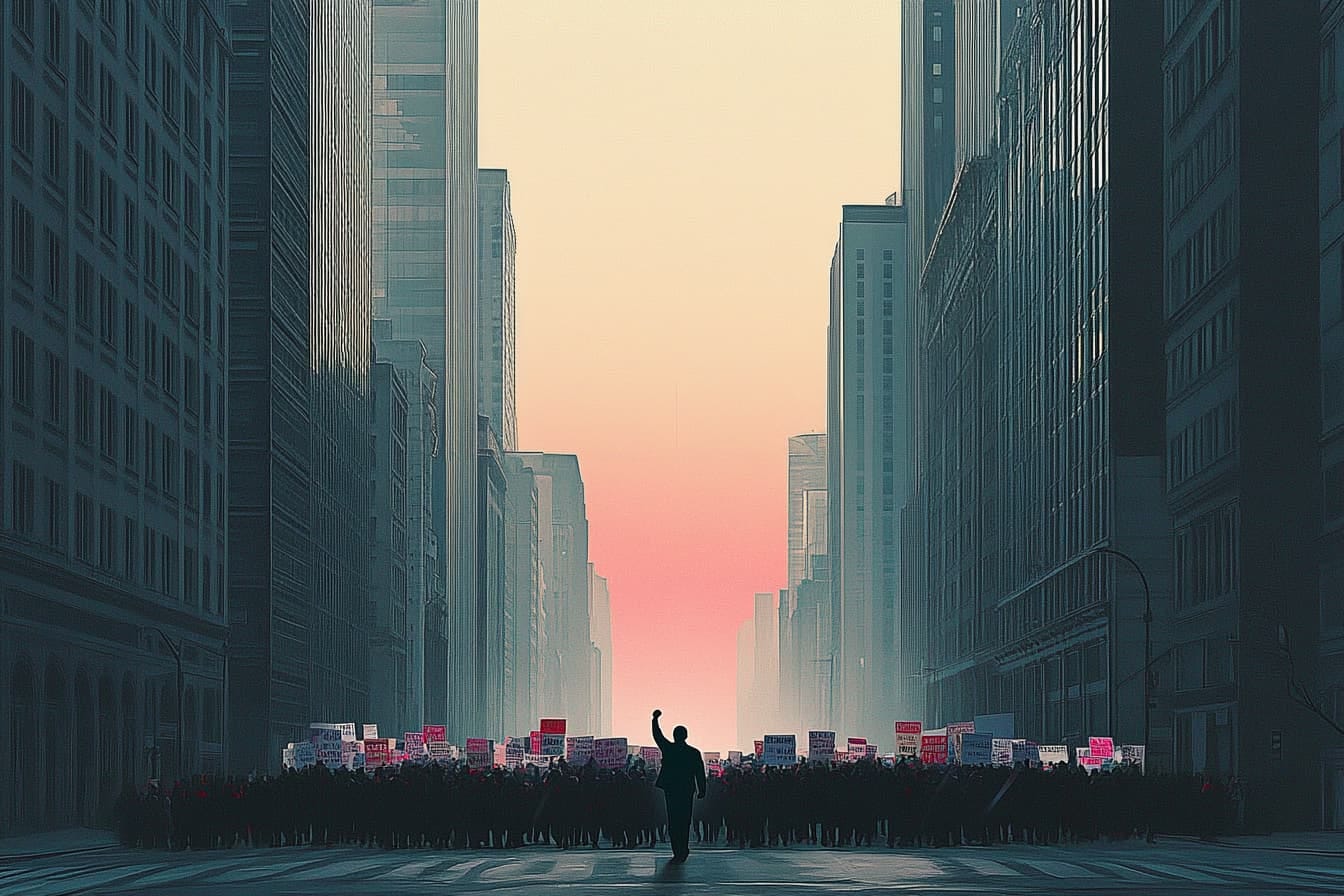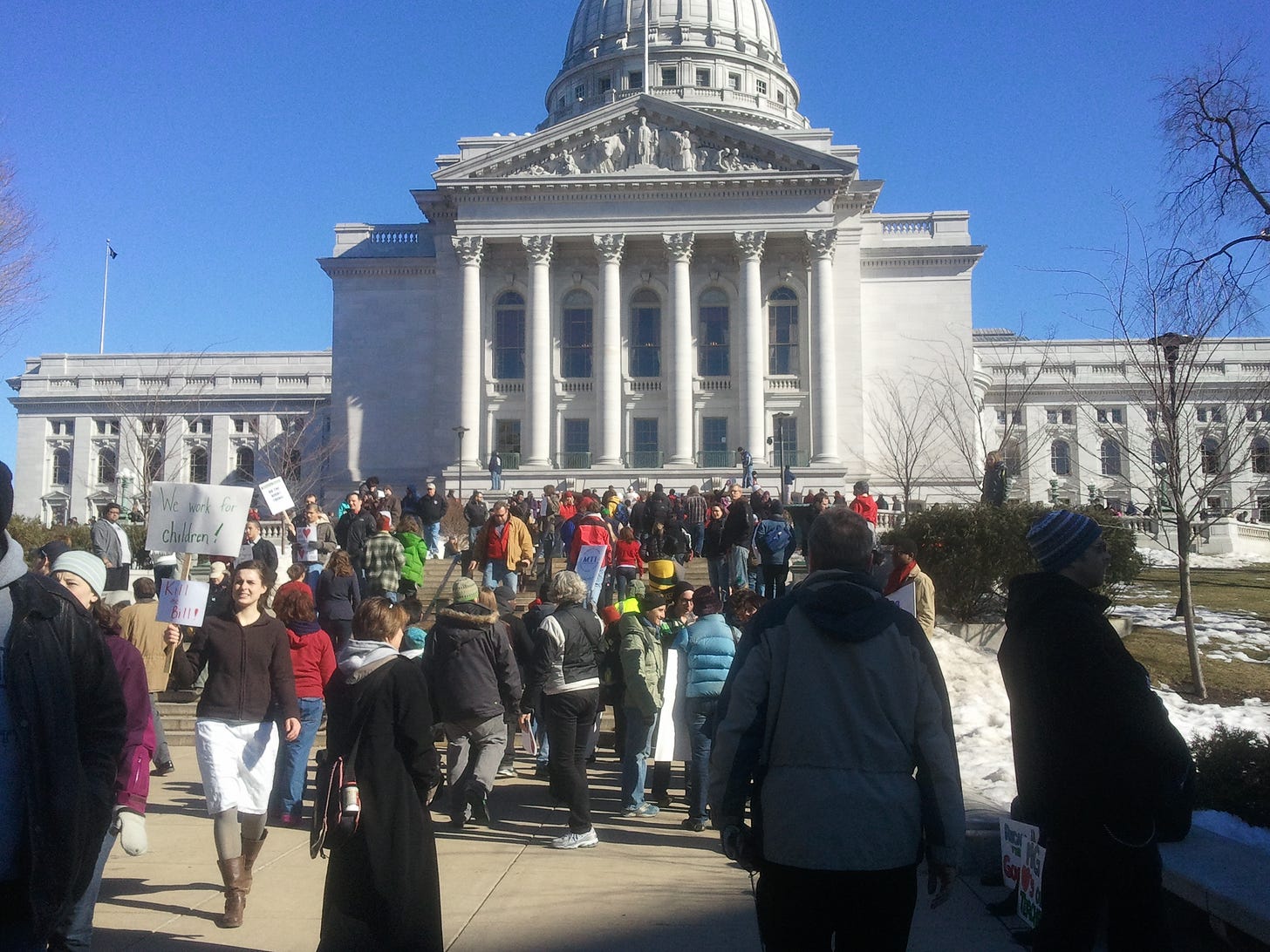Yesterday the Screen Actors Guild went on strike after negotiations with Hollywood studio executives broke down. SAG-AFTRA president Fran Descher delivered a fiery speech, which ended with:
“We are labor, and we stand tall, and we demand respect and to be honored for our contribution. You share the wealth because you cannot exist without us.”
SAG-AFTRA joins the Writers Guild of America, which has been on strike since May, in protest over proposed contracts with the studios. Dinsey CEO Bob Iger called the strike “disturbing” saying, “There’s a level of expectation that they have, that is just not realistic.” Imagine having that perspective with a net worth of $690 million and scrutinizing people who are trying to earn the minimum $26,000 per year required to maintain health insurance through the guild.
I’ve watched the fight of workers over the past several years, starting with The Great Resignation. While carried out by individual employees, that period of time was a collective movement — a sweeping statement by people saying, “We don’t have to take this anymore. Treat us better, or we’ll go elsewhere.”
Companies clapped back hard, leading to mass layoffs as they tightened their grip and tried to instill fear. What may have started as a necessary move from venture capital-backed companies that overspent and overreached during the hypergrowth phase of 2020 and 2021 quickly became a domino effect. Companies like Meta and Microsoft that could clearly afford to retain their employees hopped on the bandwagon and cut tens of thousands of employees as a “cost-cutting measure” necessary to achieve the company’s goals.
Those goals? To maintain record profits.
The fight begins
I didn’t pay much attention to the fight of labor unions until 2011. If I’m being honest, it wasn’t an issue that was important to me… until it was thrust into the limelight in my home state of Wisconsin.
Then-governor Scott Walker proposed to strip public-sector unions of their collective bargaining rights, most notably the teachers’ union (yet public safety unions such as police and firefighters were exempt). Under the proposal, the unions could not collectively bargain for pensions and healthcare, and limited pay raises. Within a few days, hundreds of thousands of people descended on the Capitol in Madison.
And I joined them. I drove from Illinois with my 17-month-old son in tow. I have family members and close friends that are teachers in Wisconsin and was appalled that they could summarily be told “Your rights don’t exist anymore.”
It was exhilarating to see people fight back. The fourteen Democratic senators fled the state to prevent the necessary quorum for a vote on the bill that would strip the unions of their rights. The bill was amended to that it could be voted on without a quorum, and passed. There was an attempt to recall Gov. Walker, but it failed.
The fight continues
I didn’t think much about labor for the next decade. Perhaps it was on the periphery, but never at the forefront of my work experiences or the current events I followed.
That all changed in 2021 when I quit a job I’d been at for 15 years. I didn’t know it at the time, but I was an early arrival in the movement that would later be known as The Great Resignation.
As millions of workers quit their jobs over the next several months, I cheered them on. In December 2021, I wrote:
“Employees are saying “nope” to the ungrateful, micromanaging, controlling, in-office pre-Covid world. The more that companies try to tighten their grip, the more people leave. And the choices are endless: it is a wide-open world of places that are desperate to hire.”
Sadly, I underestimated how much companies wanted to maintain their power. And I saw some additional battles play out in my own world.
I joined a content marketing agency that was bursting with growth. I found myself surrounded by nearly one hundred extremely talented writers, most of whom had a lot more marketing experience than me. I felt inadequate as I embarked on this new career, so I worked hard to keep my clients happy and turn in my assignments on time.
The vibe at the company was cheerful and positive — completely the opposite of the toxic environment I’d left behind when I pivoted. I learned later that the company had imposed a “no venting policy.” In reality, writers were burning out left and right, and also felt alone since they couldn’t commiserate with other writers. Yet the leadership team constantly bemoaned that the writers weren’t doing enough.
In hindsight, this was the company’s deliberate attempt to keep writers “down,” when in fact, the writers held and enormous amount of power. It was their work that kept the money coming in, yet their craft was reduced to output and monthly recurring revenue. In a Glassdoor review of the agency, one former employee wrote:
“[The company] really could have been the very best content marketing agency in the world. They had a truly world-class team and a reputation to match. But instead of investing in that talent and building on that brand equity, they squandered it all in the name of wildly unsustainable growth for no other reason than to satisfy the founder’s greed.”
Out of sheer curiosity, I kept my eye on the agency after I left and watched the revolving door of writers. Finally, the company laid off more than two-thirds of its staff a few months ago, a surefire sign of its death spiral.
Someone I know (we’ll call him Andrew) works for the technology department of a financial services company. Half of his team was laid off a few weeks ago. Andrew received a promotion to lead the remaining team… but the promotion came without a pay raise.
Andrew complained to the HR department. He was told that a raise could not happen until his annual review in September. He pointed out that if someone had been hired from the outside to lead the team, that person would have been compensated appropriately. The HR team acknowledged that would be the case, and still denied Andrew’s request for a raise.
The layoffs were explained as a “necessary cost-cutting measure.” Meanwhile, the company has posted record profits over the past year. Part of Andrew’s compensation includes quarterly bonuses, which have decreased over the past several quarters. He wonders where the money is going since it’s certainly not landing in the pockets of the people actually doing the work.
Greed is the name of the game. Companies saw during The Great Resignation that they could not retain the talent needed without making concessions to employees, whether with remote work, work-life balance, or increased pay (or all three).
And now they’re trying to squeeze people, pulling back on any gains made as individuals throughout 2021. It’s demoralizing for anyone working and laid off people who have been looking for work in this tumultuous environment.
A seminal hour
There’s a big difference between thinking about work from an individual perspective and thinking about it from a collective perspective.
The capitalist system is rigged to favor people in power and we’ve reached a point where the current work model is unsustainable for most people. We can’t work more, be paid the same or less, while also in constant fear of losing our jobs in the name of greed.
In her speech about the SAG strike, Drescher pointed out that executives are on the wrong side of history and called this a “seminal hour.” The fight extends beyond Hollywood, as unions have been on the rise for several years, pushing back against corporations like Starbucks and Amazon.
I’m a proud member of the National Writer’s Union and the Freelance Solidarity Project. In 1981, several thousand writers gathered to form the NWU and listened to a speech by the incomparable Toni Morrison. She said:
“We don’t need any more writers as solitary heroes. We need a heroic writer’s movement.”
I saw a glimmer of collective action during the Great Resignation, even if it was happening on an individual level. I hope that the publicity around the WGA and SAG strikes reminds people just how powerful they are.
You can also follow me on LinkedIn for more insights about work, Threads where I’m a bit spicier, and my blog where I share tips for solopreneurs. Or, catch up on the personal side of my life here.
If you want to support me as a writer, you can buy me a coffee.





Brilliant!! So well expressed. Thank you.
Damn Anna. I LOVE this. I can't wait to see what else you write. I hope you lean into this HARD.
Standing ovation from Atlanta!